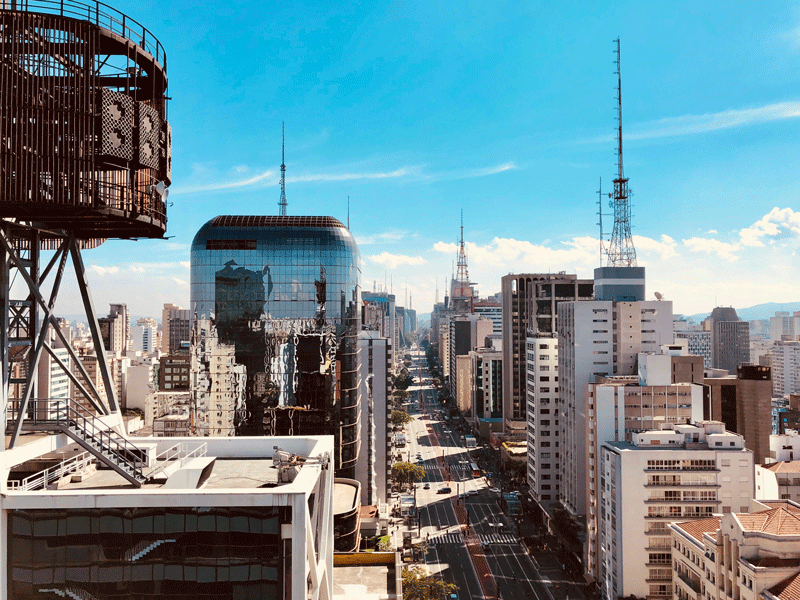
Photo of Sao Paulo, Brazil, by Joao Tzanno on Unsplash 
Author: Emily Cashen
April 12, 2021
In recent years, Latin America has established itself as one of the world’s most promising regions for start-up activity and burgeoning tech talent. Venture capital investment in Latin American tech has been growing steadily over the past five years, doubling annually since 2016 before reaching a record high of $4.6bn in 2019. The COVID-19 recession has, of course, impacted this flow of investment pouring into the region, but many of Latin America’s thriving start-up communities – from Brazil through to Mexico – have shown remarkable adaptability and resilience in the face of the numerous challenges of the past year. Here, World Finance takes a look at five of Latin America’s most exciting tech hubs.
1 – São Paulo
The vibrant city of São Paulo is often referred to as Brazil’s innovation powerhouse, with its dynamic tech community attracting a steady flow of VC funding from all over the world. Indeed, over 60 percent of start-up investments in Brazil are concentrated in the city, and it’s not hard to see why. The south-eastern megalopolis is home to a rich tech ecosystem, which supports an impressive number of local ‘unicorns,’ as well as boasting more fintech start-ups than any other Latin American city. It’s hardly surprising, therefore, that tech giants such as Amazon, Uber and Spotify have chosen the city as their Latin American base. The well-established nature of São Paulo’s technology sector has spared it from the worst of the COVID-19 recession, with many of its start-ups not just surviving, but thriving in these economic hard times.
2 – Mexico City
Home to over 21 million people, the sprawling megacity of Mexico City is fast establishing a reputation as one of Latin America’s most promising tech hubs. For many investors, Mexico is something of a gateway to the rest of Latin America – while Brazil might be more populous, its primary language is Portuguese, which can pose a challenge to businesses looking to establish a wide-reaching Latin American presence. Spanish-speaking Mexico, meanwhile, provides the ideal entry point to the region’s growing economies, while its capital Mexico City also enjoys a strategic location, with the US tech hubs of Los Angeles and Austin a relatively short flight away. Streaming giant Netflix is one of many big-name companies that have established a regional headquarters in Mexico City, marking a vote of confidence in the city’s thriving tech community.
3 – Santiago de Chile
There’s a good reason why the Chilean capital has earned itself the nickname ‘Chilecon Valley.’ A rather remote city, surrounded by the Andean mountains, Santiago is perhaps an unlikely tech hub, but it has long been a hotspot for entrepreneurial activity. Back in 2010, the Chilean government launched the ‘Start-up Chile’ seed accelerator for small business, which provides equity-free investments for start-ups from around the globe. Since its launch, it has worked with over 1,500 start-ups from 80 different countries, in what has been hailed as a world-leading programme. What’s more, the nation ranks as Latin America’s top country for entrepreneurship, according to the 2020 edition of the Global Entrepreneurship Index, with a forward-thinking and adaptable tech community that will help to drive recovery in the aftermath of the Coronavirus crisis.
4 – Buenos Aires
Some of Latin America’s most successful start-ups have been borne out of the Argentine capital of Buenos Aires – and it’s not just by chance. The city is home to a vibrant and ever-expanding technological ecosystem, gaining a reputation as the region’s best performing tech incubator. Ecommerce giant Mercado Libre – often called the Amazon of Latin America – is undoubtedly the city’s greatest success story, but Buenos Aires is also establishing a name for itself as a regional blockchain hotspot, with the number of Argentinian blockchain and cryptocurrency companies rising by 10 percent in 2019 alone.
5 – Medellín
Colombia’s second-largest city has seen its tech scene grow significantly in recent years. The city has been working hard to reinvent itself and shake off the reputation that has dogged it for so many years – with Time magazine dubbing it “the world’s most dangerous city” back in 1988. Nowadays, Medellín can be associated with some much more positive adjectives: innovative, open and dynamic. In 2019, two of China’s largest tech companies, Huawei and Tuya Smart, announced that they would be establishing bases in Medellín, specifically within the city’s specially-developed Innovation District. The Ruta N complex, where both firms will be based, is a co-working space designed to foster innovation and collaboration between start-ups, with hopes to grow the entrepreneurial ecosystem within the city.
